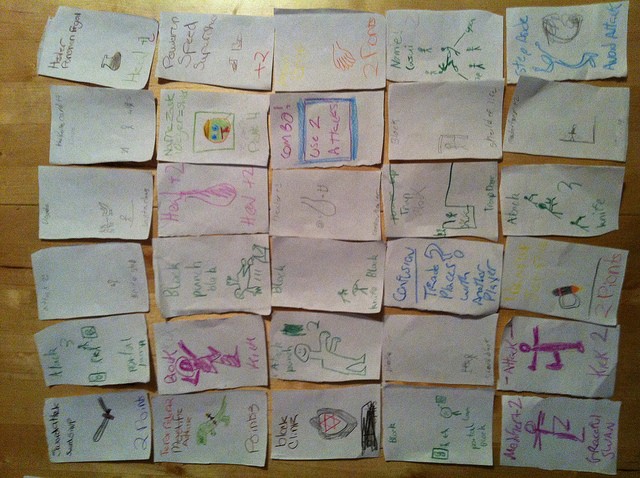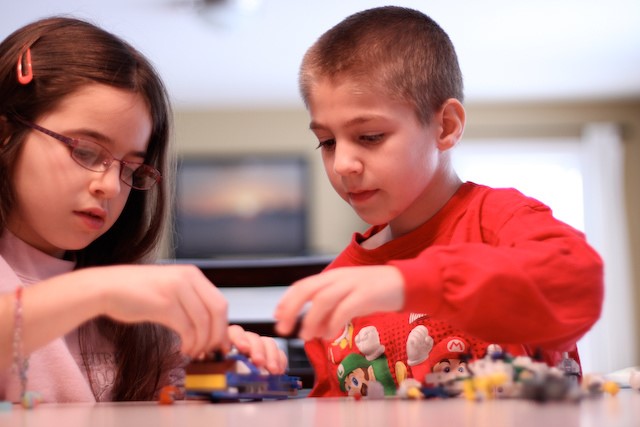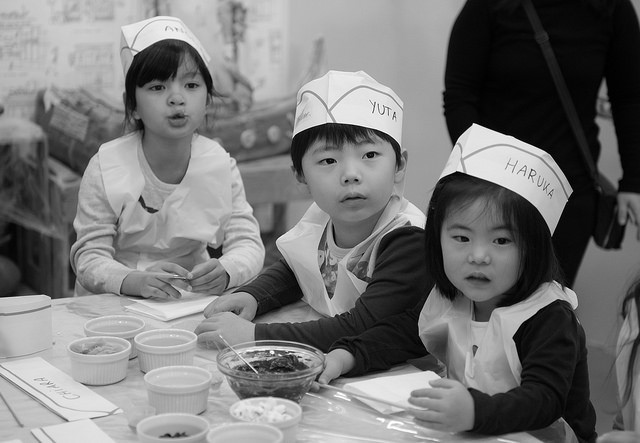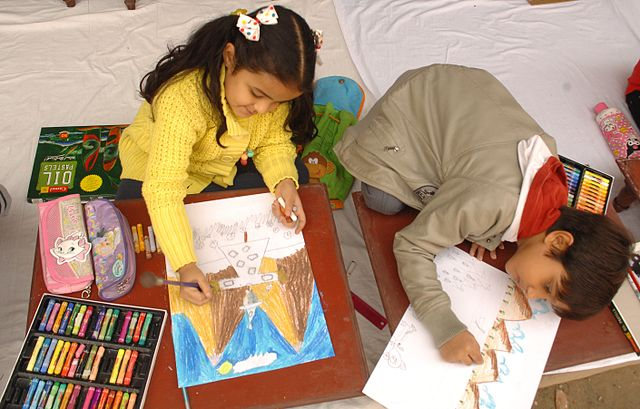Pre-school is the best time for children to learn, especially because they are surrounded with children their age and start to interact with their peers, instead of the usual mummy, daddy, auntie, uncle and grandparents. If you’re looking for some fun and stimulating games that your preschooler can play with you or, better yet, other children, here’s a handy list you can use to get started.

https://flic.kr/p/6eF4vf
1. Roleplay: Shopkeeper and shopper (2 players)
Helps with math skills, social interaction
One child (or adult) is the shopkeeper, and the other is the shopper. Imagine the shopkeeper is in his shop – take the time to describe, or create together, a believable shopfront for him or her. The shopper has a reason to purchase something from the shopkeeper. Both players talk about which items are to be bought, and at what price. Let the shopkeeper ring up the total sum of purchases for the shopper, and make sure the shopper checks as well! Bonus level: Get the players to haggle over the prices (e.g. bulk discount, end of season sale).
2. Hands On: Ice & Water (4 – 6 players)
Helps with motor skills, spatial awareness, social interaction
This game is great for children to work on muscular control. One player is “It” and the others run around in a demarcated space trying not to get tagged (touched). A player who is tagged has to freeze in place until another player taps them to unfreeze them. This game has many, many possible variations, and is great for groups of children – as long as you have enough space.

https://flic.kr/p/avRzfp
3. Brain Training: Picture matching (1 player, or more)
Helps with cognitive development, concentration
Need a child to sit in one spot and focus? Try this game! Using two sets of picture cards, arrange them face down in a grid (size of your choice). Let the child choose which card to flip over, then ask him to find the matching cards based on memory of the cards’ location. It helps if the pictures are of something they like, such as characters of their favourite video game or cartoon series. Be careful when adding more players though, as it can be either helpful, or distracting!
4. Roleplay: Inviting a friend over (2 or more players)
Helps with social interaction, language
Come up with a reason for your preschooler to invite their friend over for lunch and games. Let the child formulate the best way to open the invitation and think up an itinerary for the day’s activities. Spice the game up by making the occasion a cultural celebration, and inviting friends from other races over to celebrate together.

https://flic.kr/p/9jqYAq
5. Hands On: Building with Lego (1 or more players)
Helps with creativity, motor skills
This generational favourite needs no introduction. Start with prompts, such as a school building, a house, a car, or even everyday objects. Let your child create more and more items to expand the scale of their work (e.g. building a neighbourhood, building a park with bike paths, building a mountain range). When you can build anything you want, your imagination’s the limit.
6. Brain Training: Clapping game (1 or more players)
Helps with concentration, rhythm
Set a clapping pattern and get the child to repeat after you. If they’re too good, put on a popular song and use it as a metronome to find new clapping patterns. If the song has distracting or singalong lyrics, all the better – get them to sing while clapping to your rhythm.

https://flic.kr/p/21nAKen
7. Problem Solving: What groceries to buy? (2 or more players)
Helps with cognitive development, creativity
Come up with a menu for dinner. Let the child (or children) decide what ingredients should be added to the shopping list. Start with something simple like a fruit salad, or a noodle dish, and work in the complexity by adding courses or introducing more complicated dishes. As an added benefit, this could even start training your children to cook for you in the future.

https://upload.wikimedia.org/wikipedia/commons/thumb/6/65/Sit_and_Draw_Competition.JPG/640px-Sit_and_Draw_Competition.JPG
8. Hands On: Drawing (1 or more players)
Helps with creativity, artistic skill
Prompt the child to draw based on your suggested topics. Start with everyday items, and then move on to people, landscapes, and even scenes. Bonus level: Get them to draw comic strips with simple storylines involving themselves, their friends, or their pets.
9. Roleplay: Situational voices (2 or more players)
Helps with social awareness, voice control
Teach the children about “indoor voice” and “outdoor voice”. Find different scenarios whereby the children have to choose which voice would be most appropriate to use (e.g. in a library, while playing in the park, in a movie theatre before the movie starts, at the market). To get the children into the mood, play environment sounds for each of the scenarios so they can adjust to the noise levels they hear.

https://flic.kr/p/5MDDoY
10. Hands On: Treasure hunt (3 or more players)
Helps with motor skills, cognitive development
Quick and easy, this one can keep children occupied for ages. Construct a list of treasure hunt items that the children have to search for one by one. This game can be played indoors (fan, book, banana, pillow etc) or outdoors (leaf, flower, pebble, sand etc). Plant items if you like, or be open-ended about the items (e.g. “bring me something that’s grey”). If the group is very big, let the children search in pairs or teams.























